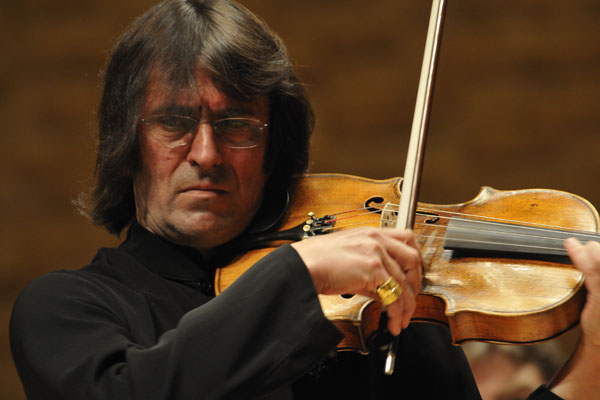Bashmet and Kissin show close rapport in Schubert and Shostakovich

While Riccardo Muti and the Chicago Symphony Orchestra were wrapping up their weekend Carnegie Hall stand in New York Sunday afternoon, a large audience filled the orchestra’s home stage for a concert by violist Yuri Bashmet and pianist Evgeny Kissin.
As always, there was a large Russian-speaking contingent in the house. “I’m really excited,” said Tatiana, a Moscow-born fan waiting in line at Will Call. “I’ve never heard either of them live and I’m looking forward to this.”
Viola recitals are a rarity, especially by anyone who is not Pinchas Zukerman. But for a rare appearance by the enigmatic Bashmet with his celebrated colleague Kissin in support, Symphony Center was filled to the rafters.
Sunday’s program led off with one of the chamber repertory’s cornerstone works, Schubert’s Arpeggione Sonata. The title instrument—a fretted guitar-like affair played with a bow— has gone the way of the dodo bird, and the melodic work is most often heard today on the cello.
Bashmet made an equally worthy case for the viola. In the first movement, in particular, the slender, higher-voiced instrument seemed more suited to the relaxed cheer and Rococo essence of the music. With light bowing, Bashmet brought a Mozartian touch to the music, his younger colleague tempering his sonority to match Bashmet’s delicacy in Schubert’s bounteous flow of melody.
The approach worked particularly well in the gentle reverie of the Adagio where both men subtly underlined the pensive expression. At times one wanted a more robust sound and variety of color from Bashment’s spare, rather dry timbre, but the concluding variations were energetic and vitally contrasted, some miscoordination at the coda apart.
Brahms’ Viola Sonata in E flat major proved more controversial. Here Bashmet aptly brought a warmer, richer sound to this interior, autumnal work, originally crafted for clarinet.
But at times the violist’s rubato seemed to push the rhapsodic nature of this music to an extreme, with slowing down and dawdling that impeded momentum. There were fine moments yet at times the two men’s styles didn’t always seem in synch with Kissin’s polished lyricism set against Bashmet’s quirkier approach—the violist coming at the music from more of an angle, along with some wayward intonation in the process.
Shostakovich’s Viola Sonata was his final work, a bleak, death-haunted epitaph, which received the finest performance of the afternoon. From the barely audible pizzicatos that launch this dark journey, both Bashmet and Kissin seemed completely inside this music. The stark, meditative passages alternate with strange unsettling high harmonics and a fragmented theme with the feel of a Jewish folk strain that sounds like a dance of death.
Bashmet’s edgy tone is well suited to the dark, acid tinge of this music. With finely calibrated, equally expressive support from Kissin, Bashmet brought out the introspective darkness as well as the stoicism, even finding a ray of peaceful solace at the coda in this affecting performance.
Too bad the premature applause from some clap-happy audience members marred the hushed coda. No encore was offered and one would have sounded inappropriate after the black desolation of Shostakovich’s final musical testament.
Kissin has enjoyed a successful trifecta in Chicago this season with appearances in a solo Liszt recital, in the Grieg concerto with the CSO, and now as a chamber team with Bashmet. We rarely get to experience Kissin as a duo-recital partner and in his third Chicago appearance in seven weeks, Kissin proved a gracious and often deferential colleague to Bashmet, while providing individual and eloquent keyboard playing.
Posted in Performances





Posted Apr 18, 2011 at 8:11 pm by Michael P. Scott
Nice, very nice, review. My thoughts mirror yours. I’d expected, as one utterly ignorant of the viola, not to mention the viola/piano repertoire, to like the Schubert the most, followed by Brahms and Shostakovich.
In fact, however, the Shostakovich was so astonishingly beautiful I had to rank it my favorite, followed by Brahms and Schubert.
It was my first time, too, to hear — after dozens of solo and concerto recitals — Mr. Kissin as a collaborator. He’s as good at that as he is everything else.
MPS